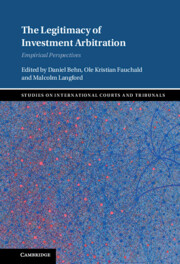Book contents
- The Legitimacy of Investment Arbitration
- Studies on International Courts and Tribunals
- The Legitimacy of Investment Arbitration
- Copyright page
- Contents
- Figures
- Tables
- Contributors
- 1 Introduction: The Legitimacy Crisis and the Empirical Turn
- 2 The International Investment Regime and Its Discontents
- Part I Process Legitimacy
- 3 Testing Cognitive Bias: Experimental Approaches and Investment Arbitration
- 4 The Influence of Law Firms in Investment Arbitration
- 5 Arbitrator Challenges in International Investment Tribunals
- 6 Dissents in Investment Arbitration: On Collegiality and Individualism
- Part II Process Legitimacy
- Part III Output Legitimacy
- Part IV Legitimation Strategies
- Index
4 - The Influence of Law Firms in Investment Arbitration
from Part I - Process Legitimacy
Published online by Cambridge University Press: 06 January 2022
- The Legitimacy of Investment Arbitration
- Studies on International Courts and Tribunals
- The Legitimacy of Investment Arbitration
- Copyright page
- Contents
- Figures
- Tables
- Contributors
- 1 Introduction: The Legitimacy Crisis and the Empirical Turn
- 2 The International Investment Regime and Its Discontents
- Part I Process Legitimacy
- 3 Testing Cognitive Bias: Experimental Approaches and Investment Arbitration
- 4 The Influence of Law Firms in Investment Arbitration
- 5 Arbitrator Challenges in International Investment Tribunals
- 6 Dissents in Investment Arbitration: On Collegiality and Individualism
- Part II Process Legitimacy
- Part III Output Legitimacy
- Part IV Legitimation Strategies
- Index
Summary
Challenges to investment arbitrators are increasingly common. Using data from different arbitral institutions up to 2019, this chapter traces a remarkable upsurge in the number of arbitrator challenges from 2010 to the present. On the one hand, many challenges may be of a purely tactical character, designed by the parties – typically the respondent state – to delay proceedings or pressure a party to settle or withdraw a complaint. On the other hand, many arbitrators may be legitimately vulnerable to challenges; and the increase in number may suggest that the system is (or should be) taking more seriously concerns such as repeat appointments by the same party, double hatting, and issue conflicts. The author argues that arbitrator challenges may contribute to the legitimacy of the adjudicative process. They ensure that independence and impartiality is maintained in practice and signal to prospective arbitrators and their appointers the risks of non-disclosure or certain types of appointments.
Keywords
- Type
- Chapter
- Information
- The Legitimacy of Investment ArbitrationEmpirical Perspectives, pp. 100 - 132Publisher: Cambridge University PressPrint publication year: 2022
- 1
- Cited by

